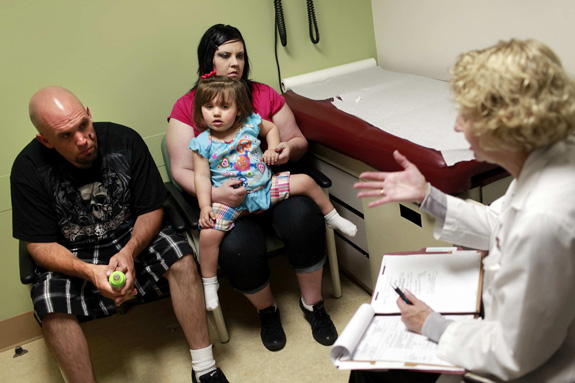Doctors Get New Recommendations For Diagnosing Disabilities

Genetic counselor Michelle Fox, right, talks with William Hanberg and Heather Spear about development concerns with their daughter EmmaRose. The American Academy of Pediatrics is putting out new recommendations for doctors diagnosing children with intellectual disability and global developmental delay. (Jay L. Clendenin/Los Angeles Times/MCT)
A major pediatricians’ group is issuing new guidelines for physicians diagnosing intellectual and other developmental disabilities.
In a clinical report published Monday in the journal Pediatrics, the American Academy of Pediatrics updated its recommendations, which were first released in 2006.
Specifically, the new report emphasizes advances in genetic testing in recent years that can aid in providing a more precise diagnosis for children with various delays.
Advertisement - Continue Reading Below
In cases where a child has been identified as having intellectual disability or global developmental delay, but the cause is unknown, doctors are advised to work with a genetics specialist to conduct chromosomal microarray testing, which can detect genetic abnormalities, and fragile X testing. Metabolic testing should also be considered, the guidance indicates.
If the tests do not produce any conclusive result, physicians are then urged to consider other approaches depending on the gender of the child and possibly perform a brain MRI and refer patients to outside specialists.
It is important to identify the root of a child’s disability, when possible, to provide the most appropriate treatment plan, the report said. What’s more, identifying a precise diagnosis can help families manage expectations, advocate for their child and obtain services and supports, they indicated.
Beyond diagnosing children, the recommendations also emphasize the responsibility doctors have to help connect families with special education and developmental services.
Read more stories like this one. Sign up for Disability Scoop's free email newsletter to get the latest developmental disability news sent straight to your inbox.


